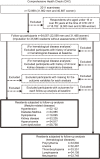Effects of External Radiation Exposure Resulting From the Fukushima Daiichi Nuclear Power Plant Accident on the Health of Residents in the Evacuation Zones: the Fukushima Health Management Survey
- PMID: 36464304
- PMCID: PMC9703929
- DOI: 10.2188/jea.JE20210286
Effects of External Radiation Exposure Resulting From the Fukushima Daiichi Nuclear Power Plant Accident on the Health of Residents in the Evacuation Zones: the Fukushima Health Management Survey
Abstract
Background: Associations have been reported between lifestyle-related diseases and evacuation after the Great East Japan Earthquake (GEJE). However, the relationship between lifestyle-related diseases and the effective radiation dose due to external exposure (EDEE) after the GEJE remains unclear.
Methods: From among 72,869 residents of Fukushima Prefecture (31,982 men; 40,887 women) who underwent a comprehensive health check in fiscal year (FY) 2011, the data of 54,087 residents (22,599 men; 31,488 women) aged 16 to 84 years were analyzed. The EDEE data of 25,685 residents with incomplete results from the basic survey, performed to estimate the external radiation exposure dose, were supplemented using multiple imputation. The data were classified into three groups based on EDEE (0 to <1, 1 to <2, and ≥2 mSv groups and associations between the incidence of diseases and EDEE from FY2011 to FY2017 were examined using a Cox proportional hazards model, with FY2011 as the baseline.
Results: A higher EDEE was associated with a greater incidence of hypertension, diabetes mellitus, dyslipidemia, hyperuricemia, liver dysfunction, and polycythemia from FY2011 to FY2017 in the age- and sex-adjusted model. However, after further adjustment for evacuation status and lifestyle-related factors, the significant associations disappeared. No association was found between EDEE and other lifestyle-related diseases.
Conclusion: EDEE was not directly associated with the incidence of lifestyle-related diseases after the GEJE. However, residents with higher external radiation doses in Fukushima Prefecture might suffer from lifestyle-related diseases related to evacuation and the resultant lifestyle changes.
Keywords: comprehensive health check; external radiation exposure dose; lifestyle-related disease; lymphopenia; neutropenia.
Conflict of interest statement
Conflicts of interest: None declared.
Figures


Similar articles
-
Trends in Lifestyle-related Diseases and Their Risk Factors After the Fukushima Daiichi Nuclear Power Plant Accident: Results of the Comprehensive Health Check in the Fukushima Health Management Survey.J Epidemiol. 2022;32(Suppl_XII):S36-S46. doi: 10.2188/jea.JE20210386. J Epidemiol. 2022. PMID: 36464299 Free PMC article.
-
Psychological distress after the Great East Japan Earthquake and Fukushima Daiichi Nuclear Power Plant accident: results of a mental health and lifestyle survey through the Fukushima Health Management Survey in FY2011 and FY2012.Fukushima J Med Sci. 2014;60(1):57-67. doi: 10.5387/fms.2014-1. Epub 2014 Jul 15. Fukushima J Med Sci. 2014. PMID: 25030715
-
Health management and care following the Fukushima nuclear power plant accident: overview of Fukushima Health Management Survey.Ann ICRP. 2021 Jul;50(1_suppl):82-89. doi: 10.1177/01466453211015402. Epub 2021 Jul 5. Ann ICRP. 2021. PMID: 34218678
-
Comprehensive Health Risk Management after the Fukushima Nuclear Power Plant Accident.Clin Oncol (R Coll Radiol). 2016 Apr;28(4):255-262. doi: 10.1016/j.clon.2016.01.001. Epub 2016 Jan 23. Clin Oncol (R Coll Radiol). 2016. PMID: 26817782 Review.
-
Radioactive Doses - Predicted and Actual - and Likely Health Effects.Clin Oncol (R Coll Radiol). 2016 Apr;28(4):245-54. doi: 10.1016/j.clon.2015.12.028. Epub 2016 Jan 21. Clin Oncol (R Coll Radiol). 2016. PMID: 26805911 Review.
Cited by
-
Model-based estimation of thyroid cancer incidence from ultrasound examinations in the Fukushima Health Management Survey: estimated results considering the non-examinees in the first, second and third rounds of the cohort study.BMJ Open. 2025 Jun 4;15(6):e084885. doi: 10.1136/bmjopen-2024-084885. BMJ Open. 2025. PMID: 40467317 Free PMC article.
-
Effects of External Radiation Exposure on Perinatal Outcomes in Pregnant Women After the Fukushima Daiichi Nuclear Power Plant Accident: the Fukushima Health Management Survey.J Epidemiol. 2022;32(Suppl_XII):S104-S114. doi: 10.2188/jea.JE20210252. J Epidemiol. 2022. PMID: 36464294 Free PMC article.
-
Trends in Lifestyle-related Diseases and Their Risk Factors After the Fukushima Daiichi Nuclear Power Plant Accident: Results of the Comprehensive Health Check in the Fukushima Health Management Survey.J Epidemiol. 2022;32(Suppl_XII):S36-S46. doi: 10.2188/jea.JE20210386. J Epidemiol. 2022. PMID: 36464299 Free PMC article.
-
Achievements and Current Status of the Fukushima Health Management Survey.J Epidemiol. 2022;32(Suppl_XII):S3-S10. doi: 10.2188/jea.JE20210390. J Epidemiol. 2022. PMID: 36464298 Free PMC article.
-
A Special Issue on Fukushima Has Been Released a Decade After the Great East Japan Earthquake.J Epidemiol. 2022;32(Suppl_XII):S1-S2. doi: 10.2188/jea.JE20220185. J Epidemiol. 2022. PMID: 36464293 Free PMC article. No abstract available.
References
-
- Ishikawa T, Yasumura S, Akahane K, et al. . External doses available for epidemiological studies related to the Fukushima Health Management Survey: first 4-month individual doses and municipality-average doses for the first year. J Epidemiol. 2022;32(Suppl 12):S11–S22. 10.2188/jea.JE20210166 - DOI - PMC - PubMed
-
- Kawasaki Y, Hosoya M, Yasumura S, et al. . The Basic Data for residents aged 16 years or older who received a Comprehensive Health Check examinations in 2011–2012 as a part of the Fukushima Health Management Survey after the Great East Japan Earthquake. Fukushima J Med Sci. 2014;60(2):159–169. 10.5387/fms.2014-31 - DOI - PubMed

